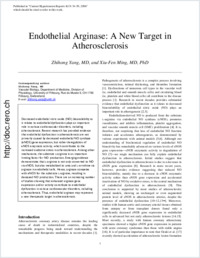Endothelial arginase: a new target in atherosclerosis
- Yang, Zhihong Vascular Biology, Department of Medicine, Division of Physiology, University of Fribourg, Switzerland
- Ming, Xiu-Fen Vascular Biology, Department of Medicine, Division of Physiology, University of Fribourg, Switzerland
-
2006
Published in:
- Current Hypertension Reports. - 2006, vol. 8, no. 1, p. 54-59
English
Decreased endothelial nitric oxide (NO) bioavailability as it relates to endothelial dysfunction plays an important role in various cardiovascular disorders, including atheroÂsclerosis. Recent research has provided evidence that endothelial dysfunction in atherosclerosis is not primarily caused by decreased endothelial NO synthase (eNOS) gene expression, but rather deregulation of eNOS enzymatic activity, which contributes to the increased oxidative stress in atherosclerosis. Among other mechanisms, the substrate l-arginine is an important limiting factor for NO production. Emerging evidence demonstrates that l-arginine is not only converted to NO via eNOS, but also metabolized to urea and l-ornithine via arginase in endothelial cells. Hence, arginase competes with eNOS for the substrate l-arginine, resulting in deceased NO production. There are an increasing number of studies showing that enhanced arginase gene expression and/or activity contribute to endothelial dysfunction in various cardiovascular disorders, including atherosclerosis. Thus, endothelial arginase may represent a new therapeutic target in atherosclerosis.
- Faculty
- Faculté des sciences et de médecine
- Department
- Département de Médecine
- Language
-
- English
- Classification
- Medicine
- License
-
License undefined
- Identifiers
-
- RERO DOC 6385
- Persistent URL
- https://folia.unifr.ch/unifr/documents/300065
Statistics
Document views: 147
File downloads:
- pdf: 260
